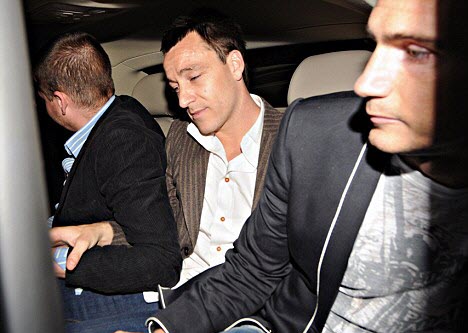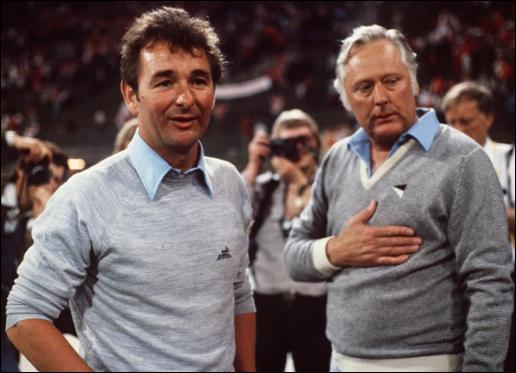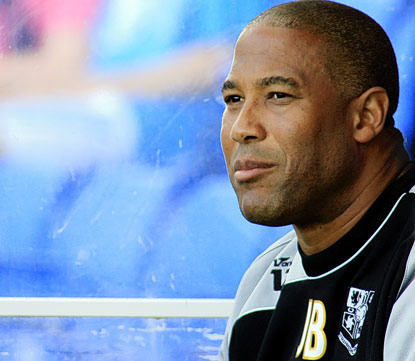July 26, 2010
Raoul Moat and radical negativity
[A belated response to the Raoul Moat/ (social) media matrix, delayed because of a pile-up of deadlines last week]
 |  |
Before I say go on, let me be very clear that I find nothing to disagree with in these three excellent articles by Martin Robbins, John Tatlock and Charlie Brooker. The descent into Chris Morris terrain was as predictable as it was rapid, but it's worth remembering that the importance and distinctiveness of Morris's approach, its superiority to witless "media satire" like Drop the Dead Donkey, was its McLuhanite formalism: it wasn't the idiocy of individuals that produced the inane delirium of news (although that certainly didn't help), it was the idiocy of the format. Nothing could prove this more than the spectacle of Jon Sopel, who seems in other contexts to be an intelligent journalist, becoming a ringmaster of the grotesque.
With the Facebook sites set up to honour Moat, communicative capitalism frayed off into a reactionary commmunicative nihilism freighted with astonishing and genuinely frightening levels of misogny worthy of Robert Johnson or Nick Cave: "He must hav really loved her to shoot her like that".
This astonishing hemorrhaging of anti-social affect - Britain's anti-Diana moment, in which the rituals of consensual sentimentality were violently inverted (flowers on the grave of a killer) - poses the same questions that Black Metal provokes. (These questions were forensically debated by
Ben Noys and Evan in their contributiions to the Black Metal Symposium, both of which later appeared in the excellent Hideous Gnosis collection.) Why does counter-consensual negativity now seem to "naturally" take a right wing form? To what extent is it possible to imagine this negativity being detached from the nationalism, racism and anti-modernism in which it is usually embedded in BM, and being deployed by another politics?
In the case of the response to Moat, potentially left wing intuitions - about police corruption, the inadequacy of mental health provision - could be found amidst the foaming racist and misogynist spew. Martin Robins talks of "the bizarre, carnival atmosphere that was allowed to develop in the village square" once the media Deathwatch took hold. One thought that occurs: why is unorganised "spontaneous" right wing sentiment capable of generating a counter-consensual carnival of such intensity that even journalists are drawn into openly defying the police? Thus Sky Reporter James Matthews wrote on Twitter that he “Was listening to negotiations till armed cop found us. Crept up silently,first i knew was when i felt his breath on my cheek”, while Channel 4's Alex Thomson tweeted: “sorry lots of Bberry tweets in dark running thru peoples, gardens evading cops – some spelling may have gone astray”. Tension between the police and journalists is hardly unprecedented, but off-the-record antatgonism is one thing; publicly defying police authority for no good reason whatsoever is another thing altogether. It is difficult to imagine journalists from these institutions engaging in similar anti-police devilment at an anti-capitalist event, so many of which try in vain to promote a carnivalesque atmosphere but end up as dreary kettles.
________________________________________________________________
Speaking of Hideous Gnosis . . . my sincere apologies to Joseph Russo for misquoting him in my review of Hideous Gnosis for The Wire. Jospeph generously and graciously says that my rendering his phrase "priests in sweatsuits" as "priests in swimsuits" gave his essay a surreal twist, but I was disapppointed in my mistake, which was all the more bizarre because, when I was reading Joesph's article, the image of "priests in sweatsuits" struck me as capturing exactly the kind of thing that BM abominates: for BM, what's worse even than traditional chrisitianity is the way that, under secular modernity, christianity has become subject to a demythologized casualization.
July 06, 2010
Football/ capitalist realism/ utopia
Actually, now seems like the time to post up this text on football and utopia I wrote last year for the Pura Vida project organised by Mark Gubbs and Hinterlands in Nottingham. It now reads like an anticipatory engagement with some of Eagleton's arguments. Believe it or not, the text was pasted up on a billboard for a week (very Ballardian). Sadly, I didn't get a chance to see it.

Football and neoliberal anti-utopianism
“English football,” the writer Robin Carmody argued on his live journal page, “is a metaphor for precisely what the neoliberals have done to England itself …” But it's more than a metaphor. Football has been at the forefront of the total re-engineering of English culture, society and economy wrought by neoliberalism over the last thirty years. Neoliberalism presented itself as supremely realistic - as the only possible realism. It told us that utopia is impossible because there is no such thing as society, only individuals pursuing their own interests. What better image of this anti-utopianism is there than the Premiership, with its imperious, untouchable elite of clubs, its synergy with multinational media conglomerates, its conspicuously consuming players, its super-predatory club owners buying success like they are buying another yacht? Competition, exploitation, the strong lording it over the weak, paparazzi snaps of the fabulously wealthy masters of the universe players exiting nightclubs, flashing their very new money: football as anti-egalitarian Nietzschean combat. Forget utopia: dream, instead - if you’re young - of eventually becoming like this, of owning these Cheshire mansions, of getting a cyborg-slick WAG; or if you’re too old to ever lace up those ultrabranded boots, get used to being inferior, to never making it - dream instead of media-transfiguration via reality TV, or of a lottery win…
Yet the Premiership is often treated as if it were a cause rather than an effect. In the lack of a coherent, general critique of capitalism, complaints about the inflation of players’ wages make no sense. After all, it is not public money being redistributed. Players’ spiralling wages are a consequence of the very market dynamics that, until last year’s bank crisis, were held to be sacrosanct. You can detect a sour anti-working class resentment - shared by self-hating elements of the working class itself - in the attack on football’s ‘undeserving’ rich. But all of this - the player’s high wages, the exorbitant ticket prices - is an effect of football’s total subsumption into post-Fordist capital. But what if it wasn’t like this? What if there had been another way?
Football’s lost utopias (in Nottingham)

There's a poignant moment in Duncan Hamilton's biography of Brian Clough - also recounted in David Peace's The Damned Utd - when Clough and Peter Taylor (who “wanted the ship-builders to earn as much as the ship-owners”) go to see Harold Wilson speak and come away glowing with the white heat of Old Labour optimism, fired up by the prospect of a new era for the proletariat. “You could hear the passion for change in what he said,” Clough told Hamilton. “We went back to Taylor’s house burning with it ourselves.” It’s like a scene from Our Friends In The North: Our Friends In The Midlands, perhaps. The future that Clough and Taylor anticipated would of course never arrive. There’s a parallel, perhaps, with another achingly painful scene in Hamiton's book: Peter Taylor speaking after Forest’s second victory in the European cup, proclaiming that this was only the beginning... What in fact lay ahead was underachievement and overpriced players, decline and mediocrity, the final dissolution of the volatile partnership between Clough and Taylor, a rift opening up between the two men that would remain bitter until Taylor's death. Who of us can identify when the moment of our greatest triumph has already passed? And how bearable would life be if we could?
If the brave new world wouldn't arrive for the working class, it did arrive for Clough personally. Instead of being at the vanguard of a newly assertive working class, Clough's period of greatest success coincided with the ebb tide of postwar proletarian collectivism. Clough was sometimes sneered at as a ‘champagne socialist’ because he saw no contradiction between being a leftist and achieving success. Like many born poor, Clough was never able to fully believe that he had finally vanquished poverty from his life - hence, all those TV appearances, ghosted columns and the bung-rumours. In his review of The Damned Utd for The Guardian, Chris Petit argued that Clough “embodied many of the forthcoming dilemmas of Thatcher's Britain, his career a constant argument between self-proclamation and partnership, between probity and the demon drink, between financial irregularity and the belief that football was about more than acquisition.” The Premiership terminated this, finally destroyed what was left of Clough’s crumbling world - a world in which working class managers could outwit and overcome puffed-up patrician patriarchs, a world in which unfancied provincial clubs could outdo the established colossuses - and his final decline was all-too punctual. With Clough an ailing Lear at the helm, Forest were relegated in 1993, at the end of the Premier League's first season.
The end of an era
May 2009. Flamboyant Barcelona outplay Manchester United in the European Champions League final. United have come to represent the harsh capitalist reality principle of modern football. Only the already-successful and the wealthy can win. Fans dream now not of their club being revivified by some Brian Clough-like managerial genius, but of it being saved by the largesse of a bored plutocrat. Barcelona famously have no shirt sponsor, and display the logo of UNICEF on their jerseys. United’s shirt sponsor is AIG, the insurance company at the heart of the financial crisis (according to The Economist, AIG’s “tentacles reach into every part of the economy.”) The neoliberal anti-utopia disintegrated with the bank bail-outs, even though it survives in an undead form as a set of defaults which continue to dominate social reality.
A non-profit making association owned and controlled by its members, Barcelona’s slogan is ‘more than a club’. Do Barca, with their foundations and educational activities, give a hint as to how football might operate in a utopia? Proletarian artistry … the beauty of teamwork, competition, yes, but not the dog-eat-dog combat of capitalist realism …There could surely be no utopia that didn’t include something like this…
Postcolonial melancholia and all that

At the risk of looking like I can only write about the World Cup at the moment - there are, I promise, a couple of big posts imminent on this site which will include new thoughts on space and hauntology - I want to reflect here on some of the recent discussions of football and politics thrown up by the World Cup and on Minus The Shooting. As for Minus The Shooting, I can only echo
Terry Eagleton's already infamous piece on the World Cup takes a surprisingly undialectical turn at the end. After a sensitive, even lyrical, evocation of football's artistry, its capacity to generate experiences of collectivity in "a social order denuded of ceremony and symbolism", Eagleton unexpectedly concludes that "the game has to be abolished." This is peremptory to say the least - and, since Eagleton makes the inevitable "opium of the people" comparison with religion, I'm tempted to offer a critique of Eagletion's critique of football in the spirit of the critique of the critique of relgion Alberto Toscano offers in his justly praised Fanaticism. To simplify his argument greatly, Alberto's claim is that the uniqueness of the mature Marx's position was that it treated religion as a symptom. Attacking religion directly would do nothing to affect the social and political conditions which allowed religion to function as a consolation and a distraction.
Some of the negative features about football that Eagleton identifies - the corporate takeover of the game, "Tory icon" Beckham - are contingent rather than necessary. Surprisingly, Eagleton mentions some of the more troubling aspects of the World Cup - the nationalism, for instance - only glancingly, and others - the increased incidence of domestic and other forms of violence associated with sporting events - not at all.

In fact, it's easy to imagine a World Cup without the trappings of consumer capitalism which, rather than being intrinsic to the tournament, perfectly fit Negri's description of Capital as parasitic upon the powers of the multitude. ITV HD's notorious blunder whereby they broadcast a Hyundai commercial over England's goal against the US unintentionally demonstrated the violence of this parasitism rather too clearly. The advertising and branding campaigns have felt for the most part, deeply tenuous and desperate; they have hung over the tournament like an irritating fog of semiotic pollution, and, like the punitively annoying, heavily repeated sponsor idents, they resemble exercises in the making of spurious connections, as if they were the result of some clever-clever competition in Nathan Barleyland (make a film linking Hyundai cars and the World Cup!) What does it mean, for example, that McDonalds is "the official restaraunt of the World Cup?" I can't help but be reminded of the Wing Commander's recent comments. "Fortunately, advertisements on the commercial channel strike the right tone. Children! Have a Mars bar! A burger! A Pepsi! The diet of future English World Cup winners." (Incidentally, speaking of the Wing Commander, it really is the case that Send Them Victorious is one of the funniest books about football ever written; it sounds fatuous to say it, but it's true, it's funny even if you don't much like football.)
Eagleton's most intriguinging remark - and one that I suspect may have been of particular interest to Giovanni - is his contrast of football's "vivid sense of tradition ... with the historical amnesia of postmodern culture, for which everything that happened up to 10 minutes ago is to be junked as antique." This characterisation of postmodern time only gives half the picture - the other side is the nostalgia mode attachment to the past, the formal repetition that hides beneath the hypberbright simulation of newness. Nevertheless, Eagleton's intuition that there is something important about the World Cup's marking of cultural time is correct. David Stubbs has argued that sport provides a unique kind of unscripted drama in collective life. Sport does not belong to the distributed time of Web 2.0, even if - as something like Twitter and indeed Minus The Shooting have shown - it can be greatly enhanced by certain aspects of Web 2.0. Like the X-Factor and Britain's Got Talent - which, in the spirit of Jameson's "Wal-Mart as Utopia" we need to learn from - the World Cup once again illustrates the continuing power of live television. Web 2.0's distributed time affines with the neoliberal notions of choice and bourgeois models of discriminating consumption (watching DVD box sets at our own pace), but these televised events involve a kind of voluntary subordination - in order to enjoy them adequately, we have to submit to them in real time. Yet this subordination is also a liberation, from digital twitch and constant partial attention and into new forms of digitally-enhanced collectivity, which are only just emerging. At the moment, it seems to be the case that such collective events cannot be demonstrated by the web alone, but the web has created a new ecology of participation around them.

John Barnes's rather suprising comments on the inherently socialistic nature of successful football sides contrasted with Eagleton's line:
- "Football is a socialist sport ... Financially, some may receive more rewards than others but, from a footballing perspective, for 90 minutes, regardless of whether you are Lionel Messi or the substitute right-back for Argentina, you are all working to the same end.
The teams which embrace the socialist ideology rather than having superstars, are the teams that are successful. Or if there are superstars they don't perceive themselves to be that. That's why I use Messi as an example. As much as he's a superstar he respects his team-mates and their collective efforts."
It would be great if Barnes's diagnosis - "Blame Thatcher", as the Spanish journalist Enric Gonzalez put it in a piece which very closely paralleled Barnes's argument - were correct. But England's worse performing period in the World Cup was actually in the pre-Thathcerite Seventies. England's failure to qualify for both the 74 and 78 tournament was another way in which the "lights went out" in the Seventies, and it deeply coloured my sense of what it meant to be English, giving me an early taste of what Paul Gilroy has called "postcolonial melancholia". I believe that, beyond the jouissance of defeatism that I've repeatedly talked about, England's long-term failure as a footballing nation has two main causes, both of which were hinted at it in Paul Myerscough's LRB blog post.

The first is institutional. The FA has gone from being a quasi-Feudalistic shambles to being a neoliberal shambles. Same English malaise, different systems. Once a crumbling repository of old English power (members of the Admiralty used to sit on committees), it is now the kind of business ontology-oriented body of which Adam Crozier was the CEO. (Crozier's dismal passage through English institutions like the FA and the Royal Mail tells its own story about life in neoliberal England.) Like English culture in general, the FA has passed from dithering cronyism to post-Fordist short-termism. Neither mode provides much appetite for planning or strategy. Reading Zone Styx's account of Germany's reconstruction after their 2001 defeat by England, one is astonished by the clear contrast with the situation in England. There is in English football no infrastructure capable of implementing a long-term strategy in the way that Germany has. Löw is not a lone aunt sally in the way that England managers are; he is the figurehead of an institutionally-defined strategy and one reason that Germany have had a consistent level of success in international football is institutional memory, something that England conspicuously lack (what they have instead is a kind of bad hauntology). The images of the returning England team folornly trudging through the non-places of defeat (car parks and unvisited airports) reminded me of similar images from 1982, and the same solutions that are being mooted now - a better youth system, a winter break - were being proposed then, when some of the senior members of the current England squad were barely born. They have even less prospect of beng implemented now than they did then, what with the power of the almighty Premiership.
The institutional problems go wider than the FA, though. As Paul Myerscough identifies, there is also the more informal anti-discourse network comprised of ex-players and the tabloid press, and their attitudes are shaped by what I think is the second key problem, the English hostitlity to abstraction. (Echoes again of Alberto's book, which argues that the poltiical pathologisation of fanaticism has usually equated it with a passion for abstraction.) This is far more deeply rooted in English culture than neoliberalism; indeed, it's the antipathy towards abstraction that made England so susceptible to neoliberal doctrines. If you want to see a buffoon empiricist, look at an English footballer. English culture's kneejerk individualism and what-you-see-is-what-you-get plain John Bull commonsense attitude makes for deep a suspicion of tactics and organisation. Much of the hostility towards Capello revolved around his not allowing someone like Gerrard to do what supposedly comes naturally to him - as if football ability were some instinctive force that can't be shaped or trained (well, I suppose Gerrard plays like that is the case). The Guardian reported earlier this month that only 2,769 English coaches hold Uefa's B, A and Pro badges; Spain has 23,995, Italy 29,420 and Germany 34,790. Meanwhile, David Beckham - a man with no coaching qualifications or experience - is in some quarters the favourite to be the next England manager.